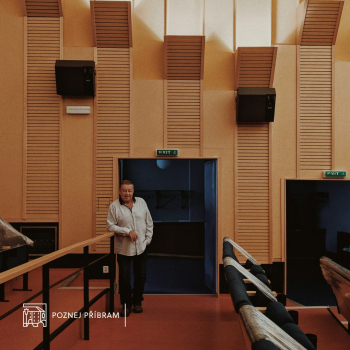Rudolf Vohnout
There are two projectors and a small workbench for repairing damaged films. But most of the work today is done by a modern projector and a server with data storage. "I still enjoy the work. It's better than sitting at home," he smiles as he lets us light up the room from the projection booth.
Rudolf Vohnout, the projectionist of the cinema in Příbram, is also inseparable from the cinema - and this is the story that brought him here.

|
Cinema as such had to do economic and political work. It had to have results in both directions. But one excludes the other. To be a cinema, it had to have a film that was preferably from the West. To do well politically, it had to be from the East, but then again, hardly anyone went to those. There have been failures, for example with The Witch's Hammer. The film was shown all over Czechoslovakia, but it was banned in the South Bohemia region and in Pribram. We don't know why, but it was banned here. However, there was a film club here, so we screened it at least within the club. And even though the film clubs were a bit more relaxed, the manager went on the carpet. I'm sure she got some kind of imaginary slap for that. |

|
By contrast, the Soviet war film "...and the mornings are quiet here" was shown compulsorily for schools, even though it contains a scene where the female engineers go to the sauna to relax and walk around naked on a widescreen. The question remains whether this film would have been compulsory for youngsters if it had not been a Soviet film. We also had an interesting German film here, Helga. There was the whole birth, completely. It was interesting that a lot of the guys who were sitting down in the hall holding the wife's hand went through the film calmly. Then when it got going, their dolls rolled and they had to go for a drink. The funny thing was, that happened to me. I was sitting in the theater with my wife and a colleague was showing. I had been screening since 8:00, and I got so sick in the booth that I flew into the restaurant for a drink and went back out again. One time we were showing the Alibi series of detective stories. The movie was about five reels long. I told my colleague that since it was a detective story, it wouldn't matter if someone switched the tapes. But she did, albeit unintentionally. And people came out of the theater saying, "Man, that was so convoluted. I didn't know how it was gonna turn out until the last minute." |

|
A lot has changed over the years. While years ago, screening was a full-fledged craft for which you needed special education culminating in a professional exam, today it is more or less a computer job. I don't shy away from any genre, but my favourites are comedies and sci-fi. It's a difficult thing for a projectionist to pick a favourite film. But if I had to, I'd pick the French comedy Friends of Daisy or the comedy The Smallest Cinema in the World. During my tenure, screeners have come and gone. I'm still here, still true to my craft. I came to it like a blind man to a violin, but I wouldn't change. I love my job.
■ Text: Zdeněk Kubát and Karel Kraus, photo: Karolina Kemtanová
|
Other articles:












